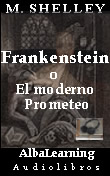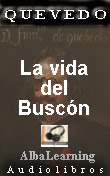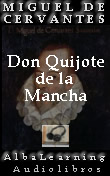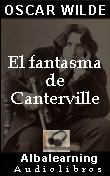|
|
|
|
| | HOME | AUDIOLIBROS | AMOR | ERÓTICA | HUMOR | INFANTIL | MISTERIO | POESÍA | NO FICCIÓN | BILINGUAL | VIDEOLIBROS | NOVEDADES | | |||||||||||||||
|
|
|
|
|||||||||||||
|
|||||||||||||||
|
Historia de un hombre supersticioso - The superstitious man's story |
||||||
Biografía de Thomas Hardy en Wikipedia |
||||||
|
||||||
| HISTORIA DE UN HOMBRE SUPERSTICIOSO |
||||||
HISTORIA DE UN HOMBRE SUPERSTICIOSO
| ||
| Double-click on any word!! | ||
[ Descargar archivo mp3 ] 13:22
(Haga doble clic en la palabra deseada en Inglés para saber su significado y pronunciación) | ||
HISTORIA DE UN HOMBRE SUPERSTICIOSO
| THE SUPERSTITIOUS MAN'S STORY
| |
| "Hubo algo muy extraño acerca de la muerte de William, ¡muy extraño de veras!” suspiró con melancolía un hombre. Era el padre del granjero, quien hasta ahora había guardado silencio. | "THERE was something very strange about William's death—very strange indeed!" sighed a melancholy man in the back of the van. It was the seedman's father, who had hitherto kept silence. | |
| “¿Y que pudo haber sido?” preguntó Mr. Lackland. | "And what might that have been?" asked Mr Lackland. | |
| William, como muchos saben, era curioso, un hombre callado; se le podía sentir cuando estaba cerca; y si estaba en la casa o en cualquier otro lugar, cerca de uno, había algo húmedo en el aire, como si la puerta del sótano se hubiera abierto al lado de uno. Bien, fue un domingo, una vez que William estaba en aparente buen estado de salud, la campana llamaba a la gente a la iglesia de buenas a primeras; el sacristán dijo que no había sentido la campana tan pesada en su mano por años, era un día domingo, como dije. | "William, as you may know, was a curious, silent man; you could feel when he came near 'ee; and if he was in the house or anywhere behind you without your seeing him, there seemed to be something clammy in the air, as if a cellar door opened close by your elbow. Well, one Sunday, at a time that William was in very good health to all appearance, the bell that was ringing for church went very heavy all of a sudden; the sexton, who told me o't, said he had not known the bell go so heavy in his hand for years—it was just as if the gudgeons wanted oiling. That was on the Sunday, as I say. | |
| Durante la semana anterior, ocurrió que la señora de William había estado hasta tarde una noche para terminar de planchar, ella había lavado para el Sr. y la Sra. Hardcome. Su marido había terminado la cena, y marchado a la cama como era usual hacía ya una o dos horas. Mientras ella estaba planchando, lo escuchó bajando las escaleras; se detuvo para ponerse las botas, que estaban al pie de la escalera, donde siempre las dejaba, y luego pasó por la sala de estar donde ella seguía planchando, pasando a través del mismo hacia la puerta. Esta era la única manera de ir desde la escalera hacia el exterior de la casa. Ninguno de los dos dijo palabra alguna, William no era un hombre de mucho hablar, en tanto su esposa se hallaba ocupada en sus labores. El hombre salió y cerró la puerta tras de sí. Ella no prestó mayor atención, pensando que su marido habría salido para fumar su pipa o para caminar un rato por la noche, y siguió planchando. Al rato terminó con su labor y, dado que su marido no había vuelto aún, lo esperó un rato, mientras guardaba la plancha y demás cosas, y dejaba lista la mesa para el desayuno matinal. Su marido seguía sin volver, pero suponiendo que lo haría pronto, ella decidió irse a la cama, cansada como estaba y dejando la puerta sin llave, comenzando a subir las escaleras, luego de escribir con tiza en la puerta: "Recuerda cerrar la puerta” (ya que era un hombre olvidadizo). | "During the week after, it chanced that William's wife was staying up late one night to finish her ironing, she doing the washing for Mr and Mrs Hardcome. Her husband had finished his supper, and gone to bed as usual some hour or two before. While she ironed she heard him coming downstairs; he stopped to put on his boots at the stair-foot, where he always left them, and then came on into the living-room where she was ironing, passing through it towards the door, this being the only way from the staircase to the outside of the house. No word was said on either side, William not being a man given to much speaking, and his wife being occupied with her work. He went out and closed the door behind him. As her husband had now and then gone out in this way at night before when unwell, or unable to sleep for want of a pipe, she took no particular notice, and continued at her ironing. This she finished shortly after, and, as he had not come in, she waited awhile for him, putting away the irons and things, and preparing the table for his breakfast in the morning. Still he did not return, but supposing him not far off, and wanting to go to bed herself, tired as she was, she left the door unbarred and went to the stairs, after writing on the back of the door with chalk: Mind and do the door (because he was a forgetful man). | |
| Para su gran sorpresa, y digamos alarma, al llegar al pie de la escalera se dio cuenta de que las botas de su marido seguían ahí, donde las había dejado cuando subió para descansar. Habiendo subido y llegado al dormitorio lo encontró en la cama, durmiendo como una roca. Como pudo haber vuelto sin que ella lo viera ni escuchara, eso estaba más allá de su comprensión. Habrá sido únicamente pasando en silencio detrás de ella mientras estaba guardando la plancha que pudo conseguirlo. Pero esto no la dejó satisfecha: era imposible en extremo que no lo hubiera notado entrar en una sala de estar tan pequeña. Ella no pudo desentrañar el misterio, y se sintió muy rara e incómoda sobre ello. Sin embargo, decidió no molestar a su marido para preguntarle, y se acostó de una vez. | "To her great surprise, and I might say alarm, on reaching the foot of the stairs his boots were standing there as they always stood when he had gone to rest. Going up to their chamber, she found him in bed sleeping as sound as a rock. How he could have got back again without her seeing or hearing him was beyond her comprehension. It could only have been by passing behind her very quietly while she was bumping with the iron. But this notion did not satisfy her: it was surely impossible that she should not have seen him come in through a room so small. She could not unravel the mystery, and felt very queer and uncomfortable about it. However, she would not disturb him to question him then, and went to bed herself. | |
| Él se levantó y salió para su trabajo muy temprano a la mañana siguiente, mucho antes de que ella se levantara, así que la mujer aguardó el regreso del marido para el almuerzo con gran ansiedad para oír la explicación, ya que habiendo pensado el asunto durante el día solo le había dejado más sobresaltada. Cuando llegó a comer, dijo, antes que ella pudiera preguntar cualquier cosa, "¿cuál es el significado de estas palabras escritas con tiza en la puerta?” | "He rose and left for his work very early the next morning, before she was awake, and she waited his return to breakfast with much anxiety for an explanation, for thinking over the matter by daylight made it seem only the more startling. When he came in to the meal he said, before she could put her question, 'What's the meaning of them words chalked on the door?' | |
| Ella le contó todo y le preguntó acerca de la noche anterior. William declaró que jamás había salido de su cama luego de acostarse, habiéndose de hecho desvestido, acostado y dormido casi instantáneamente, no levantándose hasta que el reloj dio las cinco, y él partió para su trabajo. | "She told him, and asked him about his going out the night before. William declared that he had never left the bedroom after entering it, having in fact undressed, lain down, and fallen asleep directly, never once waking till the clock struck five, and he rose up to go to his labour. | |
| Betty Privett estaba tan segura de que él había salido, como de su propia existencia, y estaba casi segura que él no había regresado. Se sentía muy disgustada de discutir con él, así que dejó el asunto como si ella hubiera estado equivocada. Cuando se fue caminando por Longpuddle Street, más tarde, se encontró con la hija de Jim Weedle, Nancy, y dijo:“¡Bien, Nancy, te ves con sueño hoy!” | "Betty Privett was as certain in her own mind that he did go out as she was of her own existence, and was little less certain that he did not return. She felt too disturbed to argue with him, and let the subject drop as though she must have been mistaken. When she was walking down Longpuddle Street later in the day she met Jim Weedle's daughter Nancy, and said: 'Well Nancy, you do look sleepy to-day!' | |
| “Sí, Mrs. Privett,”dijo Nancy. "No le vaya a contar a nadie, pero no se si usted sabrá el motivo de esto. Anoche, como era la Víspera del Verano, algunos de nosotros fuimos al pórtico de la Iglesia, y no regresamos a casa hasta cerca de la una.” | "'Yes, Mrs Privett,' said Nancy. 'Now, don't tell anybody, but I don't mind letting you know what the reason o't is. Last night, being Old Midsummer Eve, some of us church porch, and didn't get home till near one.' | |
| “¿Cómo?”, dijo Mrs. Privett. “¿Qué fue ayer? Dios, no recordaba que lo fuera; tuve mucho trabajo. No puedo recordar cuando es la Víspera del Verano y cuando es la Fiesta de San Miguel; siempre tengo mucho que hacer.” | "'Did ye?' says Mrs Privett. 'Old Midsummer yesterday was it? Faith, I didn't think whe'r 'twas Midsummer or Michaelmas; I'd too much work to do.' | |
| “Sí, y nos asustamos bastante, con lo que vimos.” | "'Yes. And we were frightened enough, I can tell 'ee by what we saw.' | |
| “¿Y qué vieron?” | "'What did ye see?' | |
| “Ustedes quizás no lo recordarán, habiéndose marchado a otros lugares siendo tan jóvenes, pero por aquí se cree que en la Víspera del Verano las formas pálidas de todas las personas de la parroquia que están cerca de la muerte dentro del plazo de un año pueden ser vistas entrando en la iglesia. Aquellos que logran vencer su enfermedad o dolencia salen luego de un rato; aquellos que están condenados a morir no vuelven a salir”. | "(You may not remember, sir, having gone off to foreign parts so young, that on Midsummer Night it is believed hereabout that the faint shapes of all the folk in the parish who are going to be at death's door within the year can be seen entering the church. Those who get over their illness come out again after awhile; those that are doomed to die do not return.) | |
| “¿Qué fue lo que viste?” Volvió a preguntar la esposa de William. | "'What did you see?' asked William's wife. | |
| “"Bien”, comenzó Nancy retrocediendo, “no necesito decirle que vimos o a quien vimos.” | "'Well,' says Nancy, backwardly—'we needn't tell what we saw or who we saw.' | |
| “Tu viste a mi marido” dijo Betty Privett, de manera serena. | "'You saw my husband,' said Betty Privettin a quiet way. | |
| “Bien, ya que lo dice,”dijo Nancy, lentamente, "creímos verlo; pero estaba muy oscuro y estábamos asustados, y por supuesto pudo no haber sido él.” | "'Well, since you put it so,' says Nancy, hanging fire, 'we—thought we did see him; but it was darkish and we was frightened, and of course it might not have been he.' | |
| “Nancy, no necesitas continuar; él nunca salió de la iglesia: lo se tan bien como tu.” | "'Nancy, you needn't mind letting it out, though 'tis kept back in kindness. And he didn't come out of the church again: I know it as well as you.' | |
| Nancy no respondió ni sí ni no a aquella aseveración, y nada más fue dicho. Pero tres días después, William Privett estaba segando con John Chiles en el prado de Mr. Hardcome, y en el calor del día se sentaron para comer algo bajo un árbol, y se vaciaron una botella de vino. Luego se quedaron dormidos sentados. John Chiles fue el primero en despertar, y, cuando miró a alrededor a su compañero de trabajo, vio una de esas grandes y blancas ánimas que nosotros llamamos —por así decirlo— polillas del molino, que salió de la boca abierta de William mientras dormía y se alejaba volando. John pensó que esto era bastante extraño, ya que William había estado trabajando en un molino durante varios años. Luego miró hacia el cielo, y se dio cuenta por el paso del sol, que habían estado dormidos por un largo rato, y, como William no despertaba, John lo llamó y le dijo que ya era hora de volver al trabajo. Su amigo seguía inmóvil, y cuando John lo movió se dio cuenta que estaba muerto. | "Nancy did not answer yes or no to that, and no more was said. But three days after, William Privett was mowing with John Chiles in Mr Hardcome's meadow, and in the heat of the day they sat down to their bit o' lunch under a tree, and empty their flagon. Afterwards both of 'em fell asleep as they sat. John Chiles was the first to wake, and, as he looked towards his fellow-mower, he saw one of those great white miller's-souls as we call 'em—that is to say, a miller moth—come from William's open mouth while he slept and fly straight away. John thought it odd enough, as William had worked in a mill for several years when he was a boy. He then looked at the sun, and found by the place o't that they had slept a long while, and, as William did not wake, John called to him and said it was high time to begin work again. He took no notice, and then John went up and shook him and found he was dead. | |
| Ahora bien, ese mismo día, el viejo Philip Hookhorn bajó al Longpuddle, para buscar un cántaro de agua; y, cuando regresó ¿a qué persona dijo haber visto bajando al arroyo por la otra orilla sino a William, que se veía muy pálido y envejecido? Esto sorprendió mucho a Philip Hookhorn, ya que hacía varios años el pequeño hijo de William —su único hijo— se había ahogado mientras jugaba en ese mismo lugar, y esto había atacado el buen juicio de William ya que nunca más se le vio cerca del Longpuddle después de este hecho, y se ha sabido que tomaba un camino que le insumía media milla de más para evitar este lugar. Más tarde se dijo que William no pudo haber estado en el arroyo, ya que estaba en ese mismo momento a dos millas de distancia; esto sin contar el hecho de que falleció en el mismo momento en que fue visto. | "Now on that very day old Philip Hookhorn was down at Longpuddle Spring, dipping up a pitcher of water; and, as he turned away, who should he see coming down to the spring on the other side but William, looking very pale and old? This surprised Philip Hookhorn very much, for years before that time William's little son—his only child—had been drowned in that spring while at play there, and this had so preyed upon William's mind that he'd never been seen near the spring afterwards, and had been known to go half a mile out of his way to avoid the place. On enquiry, it was found that William in body could not have stood by the spring, being in the mead two miles off; and it also came out that at the time at which he was seen at the spring was the very time when he died." | |
| “Una historia melancólica,”observó el hombre, luego de un minuto de silencio. | "A rather melancholy story," observed the emigrant, after a minute's silence. | |
| “Sí, sí. Bien, tenemos que tomar así todos los vaivenes de la vida,”dijo el padre del granjero. | "Yes, yes. Well, we must take ups and downs together," said the seedman's father. |
| EDGAR ALLAN POE |
|---|
AUTORES RECOMENDADOS |
 |
 |
 |
 |
 |
 |
 |
 |
|
¿Cómo descargar los audiolibros? Síganos en: |
|
||
|---|---|---|---|
|
©2021 AlbaLearning (All rights reserved) |
|---|